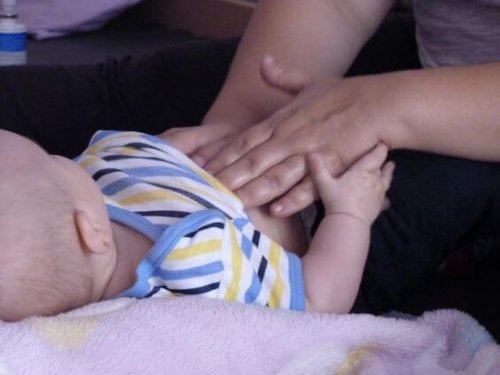How to Relieve Constipation in Children

Constipation is common in the first few months of a baby’s life. This issue is not only bothersome for your little one, but it can also become worse if you don’t do something to relieve constipation.
If your baby has released a normal amount of waste and still shows signs of discomfort, they may be constipated. Your child could be crying constantly or acting like they are making an effort to poop.
Help them relieve this issue. When the feces remain in the colon, they become drier and harder. This could cause pain upon eventual expulsion.
Colic could also be occurring, where the baby is full of gas. Colic can be a chronic problem.

How to relieve constipation?
This issue is associated directly with the baby’s diet. It occurs especially in the first few months of life because their body has not matured enough to poop normally.
At the same time, it is possible that breastfeeding is not working well for them. Take precautions to make sure that your child is breastfeeding correctly and obtaining enough milk.
If you are bottle feeding with formula, make sure the formula is not upsetting their digestion. When feeding solid foods, offer foods that don’t cause constipation.
It is a good idea to consult a specialist if you notice that your child has not pooped in two days, and when their feces are too dry and hard.
However, at home, we can apply a few remedies to relieve constipation and the discomfort it causes:
- Pediatricians suggest adding a little more water to the formula if bottle feeding
- For some moms, massaging their baby’s stomach and back and bending their knees has helped offer relief.

- We can also try giving them a little bit of lukewarm water, orange juice or prunes
- If the problem persists, the pediatrician may suggest changing their formula. Sometimes the baby can’t digest the milk protein, so soy-based or other types of formula may be helpful.
- Warm baths may be helpful
- Another option is to use glycerine suppositories if other attempts aren’t working. However, this shouldn’t be a regular practice.
- If the baby is already consuming solid foods, make it a habit to give them high fiber foods. Foods like rice and carrots increase the possibility of constipation.
- Avoid giving laxatives without a doctor’s prescription. However, you can ask your pediatrician to prescribe a stool softener.
Most likely some of these simple remedies will help your baby feel better. Also, once they reach four months of age they will be much less likely to have this problem.
After their body adapts and foods begin to be processed correctly, they will experience constipation less and less often.
However, if this is a chronic problem, the best thing to do would be to visit the pediatrician. It could be worse than constipation if your child has other symptoms like:
- A baby less than four months old that has not pooped in 24 hours
- Significant weight loss
- Presence of blood in stools
- Lack of appetite
- Small or no improvement after treatment
Constipation is common in the first few months of a baby’s life. This issue is not only bothersome for your little one, but it can also become worse if you don’t do something to relieve constipation.
If your baby has released a normal amount of waste and still shows signs of discomfort, they may be constipated. Your child could be crying constantly or acting like they are making an effort to poop.
Help them relieve this issue. When the feces remain in the colon, they become drier and harder. This could cause pain upon eventual expulsion.
Colic could also be occurring, where the baby is full of gas. Colic can be a chronic problem.

How to relieve constipation?
This issue is associated directly with the baby’s diet. It occurs especially in the first few months of life because their body has not matured enough to poop normally.
At the same time, it is possible that breastfeeding is not working well for them. Take precautions to make sure that your child is breastfeeding correctly and obtaining enough milk.
If you are bottle feeding with formula, make sure the formula is not upsetting their digestion. When feeding solid foods, offer foods that don’t cause constipation.
It is a good idea to consult a specialist if you notice that your child has not pooped in two days, and when their feces are too dry and hard.
However, at home, we can apply a few remedies to relieve constipation and the discomfort it causes:
- Pediatricians suggest adding a little more water to the formula if bottle feeding
- For some moms, massaging their baby’s stomach and back and bending their knees has helped offer relief.

- We can also try giving them a little bit of lukewarm water, orange juice or prunes
- If the problem persists, the pediatrician may suggest changing their formula. Sometimes the baby can’t digest the milk protein, so soy-based or other types of formula may be helpful.
- Warm baths may be helpful
- Another option is to use glycerine suppositories if other attempts aren’t working. However, this shouldn’t be a regular practice.
- If the baby is already consuming solid foods, make it a habit to give them high fiber foods. Foods like rice and carrots increase the possibility of constipation.
- Avoid giving laxatives without a doctor’s prescription. However, you can ask your pediatrician to prescribe a stool softener.
Most likely some of these simple remedies will help your baby feel better. Also, once they reach four months of age they will be much less likely to have this problem.
After their body adapts and foods begin to be processed correctly, they will experience constipation less and less often.
However, if this is a chronic problem, the best thing to do would be to visit the pediatrician. It could be worse than constipation if your child has other symptoms like:
- A baby less than four months old that has not pooped in 24 hours
- Significant weight loss
- Presence of blood in stools
- Lack of appetite
- Small or no improvement after treatment
All cited sources were thoroughly reviewed by our team to ensure their quality, reliability, currency, and validity. The bibliography of this article was considered reliable and of academic or scientific accuracy.
- Barboza, F. M. (2005). Evaluación y tratamiento del estreñimiento en niños. Colombia Médica, 36(2 Supl 1), 10-15. http://colombiamedica.univalle.edu.co/index.php/comedica/article/view/346
- Camarero Salces, C., & Rizo Pascual, J. M. (2011). Diagnóstico y tratamiento del estreñimiento en el niño. Información Terapéutica del Sistema Nacional de Salud, 35(1), 13-20. https://medes.com/publication/66819
- Casasnovas, A. B., Martín, F. A., Quintana, L. P., Allué, I. P., Ruiz, F. S., & Calderón, V. V. (2011, January). Recomendaciones para el tratamiento del estreñimiento funcional. In Anales de Pediatría (Vol. 74, No. 1, pp. 51-e1). Elsevier Doyma. https://www.sciencedirect.com/science/article/pii/S1695403310004819
- Ruiz, F. S., Gilbert, J. J., Calderón, P. B., & Jaime, B. E. (2010). Estreñimiento y encopresis. Acuña QM, Alonso FM, Álvarez CJ, Argüelles MF, Armas RH, Barrio MA y cols. Protocolos Diagnóstico-Terapéuticos de Gastroenterología, Hepatología y Nutrición. 2nd ed. España: Ergón SA, 53-65. http://www.aeped.es/sites/default/files/documentos/estre_encopresis.pdf
This text is provided for informational purposes only and does not replace consultation with a professional. If in doubt, consult your specialist.








